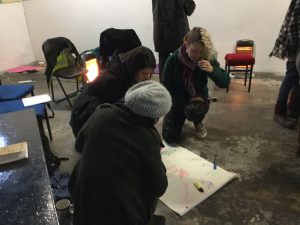A one day introduction workshop on Permaculture in Galway City Centre…. With tutors Hannah Mole and Istvan Markuly.
The day will offer an introduction to the what and the how of Permaculture, an overview of the main concepts, principles and patterns used in Permaculture design and an introduction to using applied Permaculture techniques, including Food Forest Gardening and Social Permaculture, in an urban setting.
It will be of benefit to anyone wanting to understand the basics of Permaculture, and anyone looking to use Permaculture to design and ecologically manage a piece of land at any scale be it in homes, balconies, small gardens, urban farms, roof tops as well as wider community and commercial spaces.
You will learn how to see your project from a Permaculture perspective; to think in patterns, to best identify and place elements in your project for maximum efficiency, and to make the most of natural, human and potential urban resources around you.
This workshop is an introduction to Permaculture, all are welcome to join us and no prior permaculture or gardening knowledge is required for this course
Venue: 126 Artist led Gallery, Bridget’s Palce, Galway City Centre
Date: Saturday 18th February
Time: 10am-5pm
Lunch 1-2.30 Vegan Pot luck … bring something to eat for yourself and something to share
Costs are Donation based to cover the costs of the Tutors.. suggested 25e for the day… but open to whatever people can afford to pay.
if you are thinking of joining the workshop please send us an email at thirdspacegalway@gmail.com ..or to westcorkpermaculture@gmail
This is the first in a series of workshops and public interventions in 2017, as part of a Galway Food Sovernigty and Permaculture Project, led by permaculture practitioners, gardeners, artists, Third Space, Collaborative Ways and Post Carbon Galway and with the generosity of 126 Artist led Gallery for use of venue.
As part of a Galway Food Project, it is our aim to demonstrate how it is possible to become self sufficient on a small piece of land, while fostering a self sufficiency for galway in food production as well as a safe haven for biodiversity. In this, we aim to be guided by the ethics and principles of Permaculture, working in harmony with the will of the land itself. Permaculture as a movement has most of the knowledge, tools and resources that we need to create a regenerative society in the physical sense.
Much discussion is now on the importance of ‘social permaculture’, the harder task lies in transforming our social and invisible systems, believing as we become more skillful at nurturing our human relations, we will become more effective in every aspect of our work. We believe the garden is a key to the transformation of the social fabric of the city and county which has the potential to bring meaning and integrity to our arts and culture.
Food production and consumption is a pressing global issue. Our projects aims are to highlight the huge potential of agroecology to feed Ourselves , fix broken food systems and repair damaged landscapes, providing abundant healthy and nutritious food sustainably while increasing incomes, right livlihoods, supporting the circular economy and improving climate resilience.
Our aims are to influence both food and cultural policy, production and consumption, to follow best practice in developing a local healthy, sustainable and resilient food system, and through learning about our interconnected and interdependent world, imagining and co creating more humane, just and viable ways to live in the world.
Our Galway Food Project outlines a number of goals for achieving a healthy food system:
1. Healthy Food For All
2. Grow Local
3. Strengthen the Local Economy
4. Prevent Food Waste
5.Education
We wish to build new links and partnerships in Galway between – arts, culture, food and the environment – through liaising with statutory, community and voluntary groups, educational institutions, NGOs and businesses to promote best practice, knowledge, skills and experience around food.
We wish to advocate for the development and support of innovative community food initiatives, that support right livelihoods, seek improvements in our food systems, restores and nurtures the earth, and demonstrates equitable access to quality local organic food.
for more information …
http://www.westcorkpermaculture.com/teacher-training
http://www.hannahmole.com
http://www.foodsovereigntyireland.org/
https://postcarbongalway.ie
*Permaculture designs practical ways in which we can provide food, shelter, energy & well-being, for ourselves & our communities, while also regenerating the health & wealth of this ecosystem of which we are a part. With Permaculture we can design sustainable and regenerative human habitats.
In doing so we need to take a multidiciplinary approach to design, so while food, and how it’s grown (and who grows it and where it is grown) is a major focus, so too is shelter, architecture, technology, production of other resources such as fibres and fuels as well as how we as humans live and work together.
It is a design approach which concentrates on the connections & relationships between elements & how with thoughtful consideration of these we can create productive, low-input living systems.
This first workshop will focus on providing food in an urban and suburban setting.
Covering:
-Creating a vision and identifying the key needs of the space
-Natural Patterns and flows
-Water, Soil, & Wind, management
-Key Permaculture principles and planning tools
-Design and Placement of elements
-Implementation and maintenance plans
Outcomes:
-Collaborative vision
-Draft permaculture plan for developing the space/site
-Implementation and maintenance plan
-Group cohesion, ownership of the project
-Basic Permaculture design skills.























